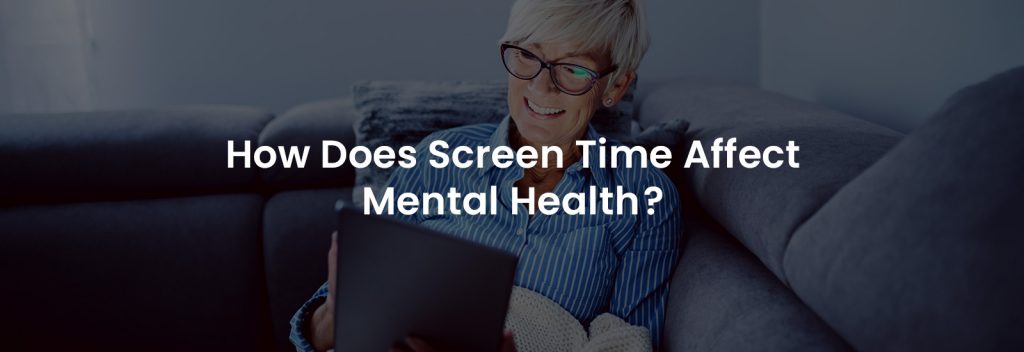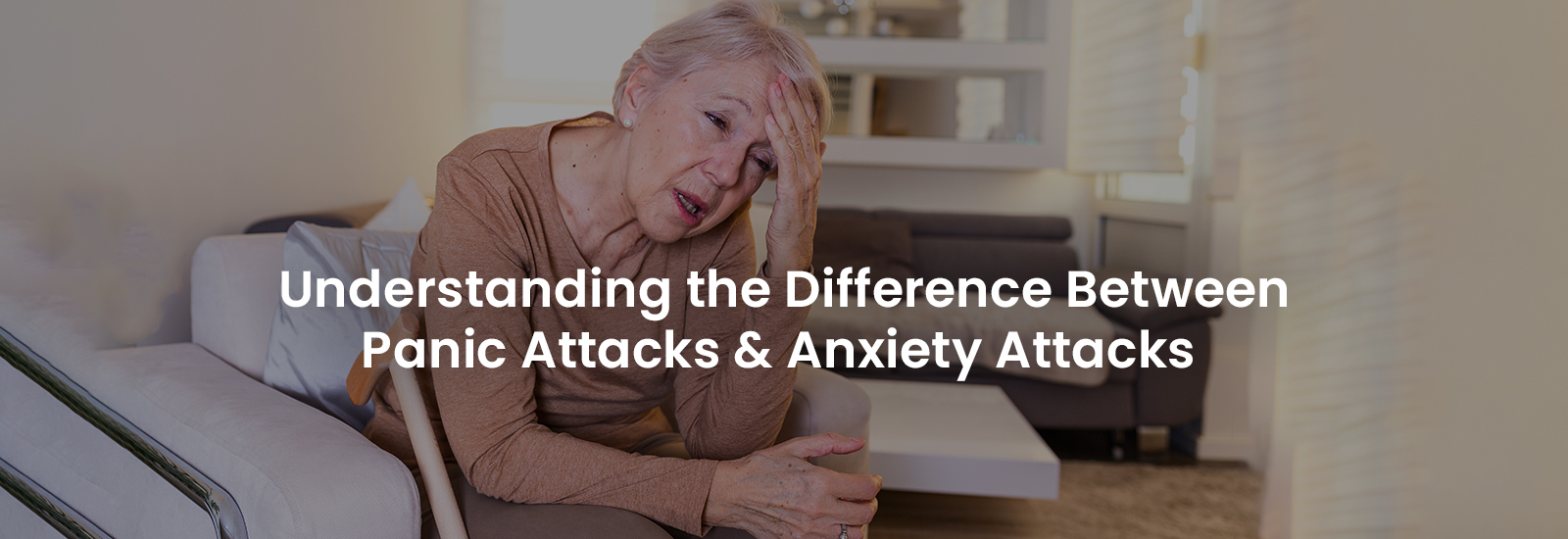
Screen time refers to the amount of time an individual spends in front of a screen, such as a computer, television, smartphone, or tablet. This can include activities like browsing the internet, streaming videos, playing video games, or using social media.
Why Seniors Have Increased Screen Time
There are several reasons why seniors may be spending more time on screens these days. For the past few years, technology has become more prevalent and easier to use, making it easier for seniors to engage with. Additionally, the COVID-19 pandemic has likely played a role in increasing screen time for seniors, as many have had to rely on technology for communication and entertainment while practicing social distancing.
Other factors that contribute to increased screen time amongst seniors may include the following:
- Loneliness: Technology can provide a sense of connection and socialization for seniors who may be isolated or living alone due to mobility issues.
- Convenience: Screens can provide seniors with easy access to information and entertainment, as well as staying connected with family and friends.
- Health concerns: Some seniors may use screens to access telemedicine services or to stay informed about their health.
Read More: List of Common Health Problems in Elderly
- Hobbies: Many seniors enjoy using screens to engage in hobbies such as playing video games, watching movies, or staying up to date with the news.
What is the Impact of Screen Time on Mental Health?
1. Positive effects
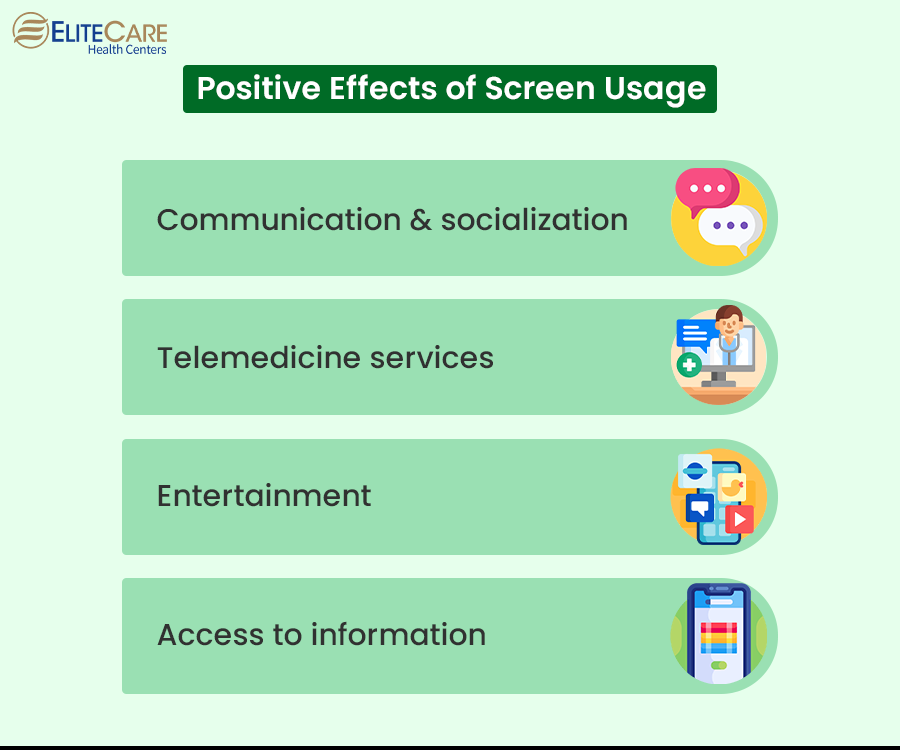
- Technology can allow individuals to stay connected with friends and family, especially for those who may be isolated or living alone. This can help to improve socialization and reduce feelings of loneliness.
- Screens can provide individuals with access to a wide range of information and resources, which can be beneficial for learning and personal growth.
- Telemedicine services, such as online consults or teletherapy, can provide individuals with access to mental health treatment that they may not have had otherwise.
- Screens can provide a source of entertainment and relaxation, which can be beneficial for mental health.
Read More: Can Certain Food Improve Your Brain Health?
2. Negative effects
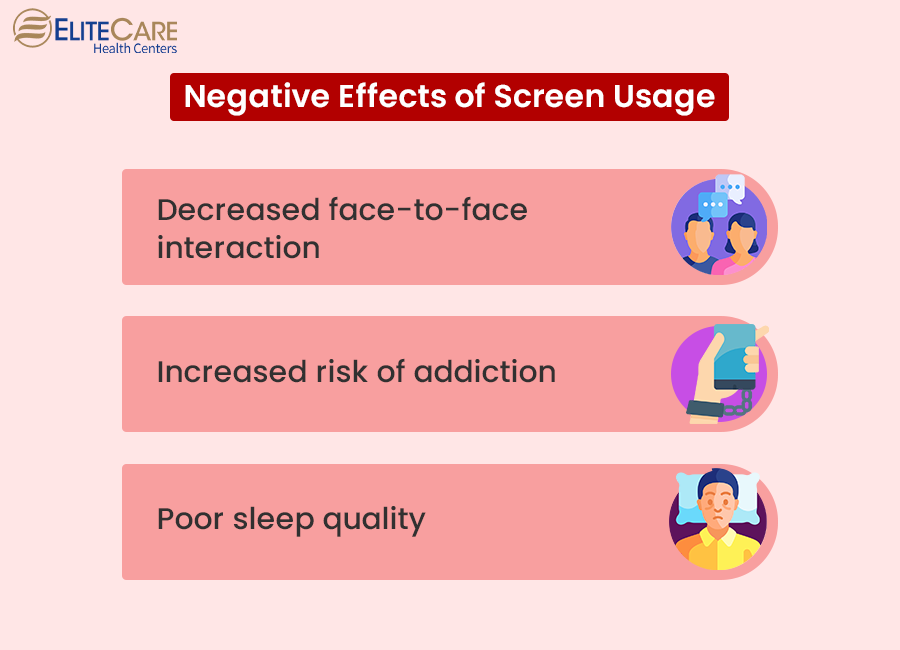
- Excessive screen time can lead to a decrease in face-to-face interaction, which can impact social skills and relationships.
- It is possible for individuals to become addicted to the use of electronic devices and the activities they engage in on them, such as social media. This can lead to negative consequences for mental health.
- The blue light emitted by screens can disrupt the body’s natural sleep-wake cycle and lead to poor sleep quality, which can negatively impact mental health.
How Much Screen Time is Too Much?
It is generally recommended that seniors limit their screen time in order to maintain their mental and physical health. However, there is no one-size-fits-all answer to the question of how much screen time is too much, as it can vary depending on the individual and their needs.
Guidelines for Screen Time:
- The World Health Organization recommends that adults limit their sedentary behavior, including screen time, to less than two hours per day.
- The National Institutes of Health recommends that adults should carry out at least 150 minutes of moderate-intensity physical activity per week, in addition to reducing sedentary behaviors such as excessive screen time.
It is important to remember that these are general guidelines for balancing screen time and mental health and may not apply to every individual. It is always a wise idea to discuss screen time and other lifestyle habits with a healthcare provider to determine what is best suited to the personal health and well-being of your elderly family members.
6 Strategies for Reducing Screen Time
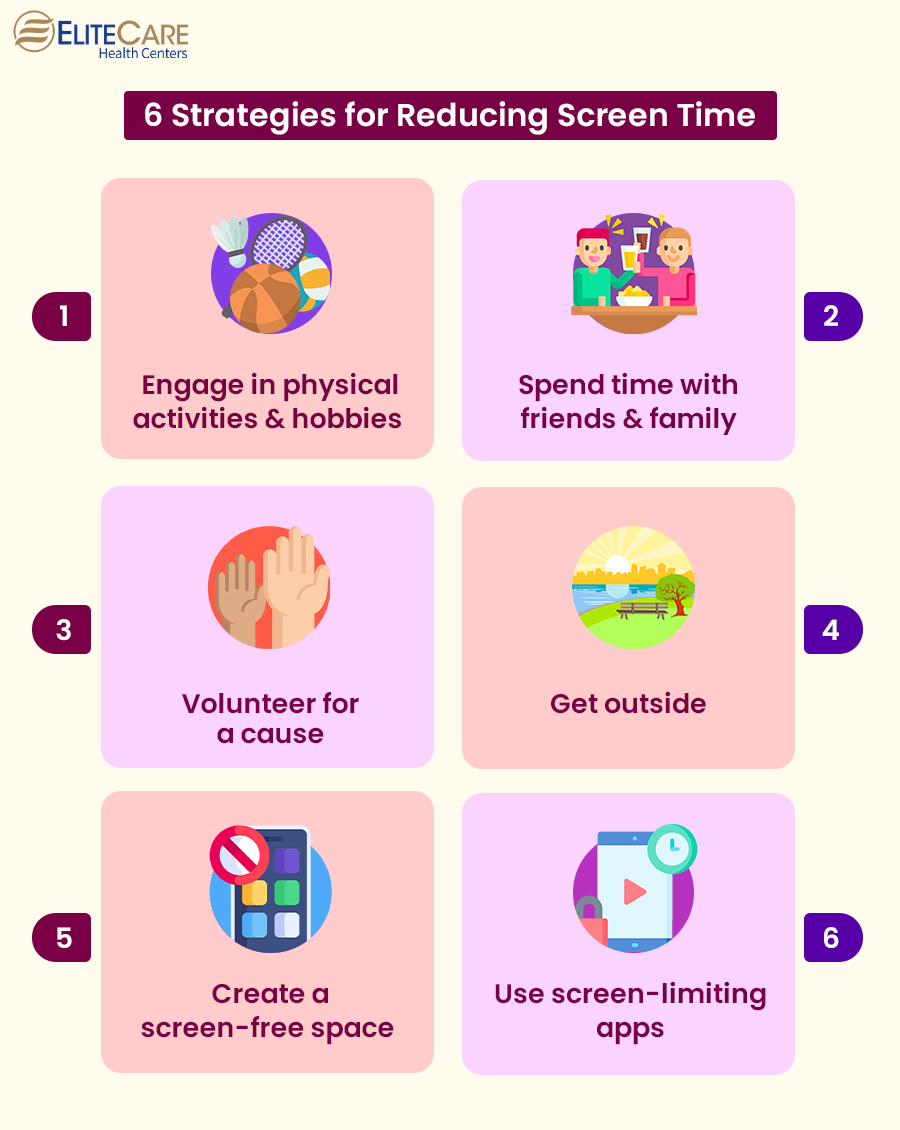
Following are a few methods and strategies that can help seniors reduce screen time effect on mental health:
1. Engaging in physical activities or hobbies
Instead of spending time on screens, ask seniors to participate in activities that get them moving, such as walking, biking, or gardening. Engaging in hobbies or creative pursuits, such as painting, knitting, or cooking, can also be enjoyable alternatives to screen time. Besides, seniors can also explore reading as it can be a relaxing and enjoyable alternative to screen time. Consider joining a book club or visiting the library to discover new books.
2. Spending time with friends and family
Instead of communicating through screens, try to spend quality time with loved ones in person. This can include activities like stepping outside for a walk or having a meal together.
3. Volunteering for a social cause
Ask seniors to volunteer for a social cause they believe in. It can provide seniors with a sense of purpose and fulfillment, which can be beneficial for mental health. It can also be a way for seniors to reduce their screen time by socializing and engaging in activities that are meaningful and rewarding, rather than relying on screens for entertainment.
4. Get outside
Walking, spending time in nature, or participating in outdoor activities can be a great way to reduce screen time and improve overall well-being.
5. Create a designated screen-free space
Consider setting up a designated space in their home that is free of screens. This can be a place to relax or spend time with others without the distractions of electronic devices.
First, choose a location in their home where they can relax and unwind. This could be a comfortable chair or couch, a porch or outdoor area, or a designated room. It is also a good idea to add calming elements such as plants, candles, or calming music to the screen-free space to create a relaxing atmosphere.
6. Use screen-limiting apps or settings
Many devices and apps offer features that can help to limit screen time, such as setting daily time limits or blocking certain apps or websites during certain hours.
It is important to remember that reducing screen time is a personal choice and what works for one person may not be effective for another. Experiment with different strategies and find out what works best for you.
Key Takeaways
While some research suggests that screen time can have positive effects, it is important to be mindful of how much time is spent online and to take regular breaks. Seniors should also look for ways to use technology to engage in meaningful activities and stay connected with family and friends. For detailed guidance, schedule an appointment in any center for primary care and consult a primary care physician. You can contact your nearest EliteCare Health Centers and schedule an appointment to consult board-certified physicians.
- Tags:center for primary careCenter For Wellnesscreen time effect on mental healthhealth and wellness centerhealth and wellness servicesimpact of screen time on mental healthmedical clinicprimary care clinic near meprimary care physicianscreen time and mental healthscreen time effect on mental healthsenior care serviceswellness care centerswellness check doctor


